© 2021 Richard Bain
© 2021 The Urantia Book Fellowship
| Song for Papa’s Family | Volume 21, Number 1, 2021 (Summer) — Index | Thinking of my Divine Mother, aka the Holy Spirit |
Both Christian theology and The Urantia Book affirm that Jesus was both human and divine. In orthodox Christian theology, Jesus is portrayed as the second person of the Trinity, God the Son. This is his divine nature according to that theology. The Urantia Book authors tell us that Jesus was indwelt by Christ Michael, a Creator Son, a Godlike being who is a creator and the spiritual head of the local universe of Nebadon. Jesus’ divine nature consisted of this being who indwelt him.
According to orthodox Christian theology, the divine Christ incarnated on earth to die on a cross to atone for the sins of humankind. But the authors of The Urantia Book reject that concept. They refer to him as Christ Michael and say he incarnated here so he could experience life as a mortal and complete the requirements to qualify as a sovereign Master Creator Son. As far as I know, while Christian theology doesn’t address this requirement, The Urantia Book addresses it in a few places.
In this article I try to determine how the two minds or consciousnesses within Jesus interacted and which was speaking at a particular time. There are a few statements in The Urantia Book that refer to the two minds [UB 136:4.4], but to determine which mind is apparently speaking at a particular time, or if they are speaking as one, requires some analysis of what is being said. Such analysis may sometimes lead us in the wrong direction, but in the absence of quotes from the authors of The Urantia Book , analysis and speculation are the only tools we have in our toolbox, so we use them. With that caveat in mind, the following is my effort to determine who is most likely speaking, the human or the divine.
As I stated previously, The Urantia Book indicates that Jesus had both human and divine consciousnesses, that both minds existed within Jesus. The authors confirm that the self- consciousness of Christ Michael was at first limited, perhaps as a condition of incarnation, and Jesus at first wasn’t conscious of the divine mind within. It appears that the divine mind of Christ Michael slowly began to appear as the human Jesus matured. Nevertheless, Christ Michael’s impressions of the world were limited to those received through the senses of the human Jesus. Perhaps during Jesus’ early years, Christ Michael was mostly a passive participant in Jesus’ life experiences. But did he begin to contribute thoughts as Jesus began his transition from childhood to adulthood? At what point did Christ Michael achieve self- consciousness in the mind of Jesus?
The Urantia Book authors conclude that Jesus first became aware of his divine nature, his dual nature, when he was age thirteen. He came to the full awareness of his divinity at his baptism by John. That appears to be the point at which Christ Michael achieved full self-consciousness within Jesus. They conclude that it was a process of discovery and not instantaneous. Note that here they do not speak of the two minds as separate self- consciousnesses.
“Of his human nature he was never in doubt; it was self-evident and always present in his consciousness. But of his divine nature there was always room for doubt and conjecture, at least this was true right up to the event of his baptism. The self-realization of divinity was a slow and, from the human standpoint, a natural evolutionary revelation. This revelation and self-realization of divinity began in Jerusalem when he was not quite thirteen years old with the first supernatural occurrence of his human existence; and this experience of effecting the self-realization of his divine nature was completed at the time of his second supernatural experience while in the flesh, the episode attendant upon his baptism by John in the Jordan, which event marked the beginning of his public career of ministry and teaching.” [UB 128:1.8]
“On this Mediterranean journey Jesus made great advances in his human task of mastering the material and mortal mind, and his indwelling Adjuster made great progress in the ascension and spiritual conquest of this same human intellect. By the end of this tour Jesus virtually knew—with all human certainty—that he was a Son of God, a Creator Son of the Universal Father. The Adjuster more and more was able to bring up in the mind of the Son of Man shadowy memories of his Paradise experience in association with his divine Father ere he ever came to organize and administer this local universe of Nebadon. Thus did the Adjuster, little by little, bring to Jesus’ human consciousness those necessary memories of his former and divine existence in the various epochs of the well-nigh eternal past. The last episode of his prehuman experience to be brought forth by the Adjuster was his farewell conference with Immanuel of Salvington just before his surrender of conscious personality to embark upon the Urantia incarnation. And this final memory picture of prehuman existence was made clear in Jesus’ consciousness on the very day of his baptism by John in the Jordan.” [UB 129:3.9]
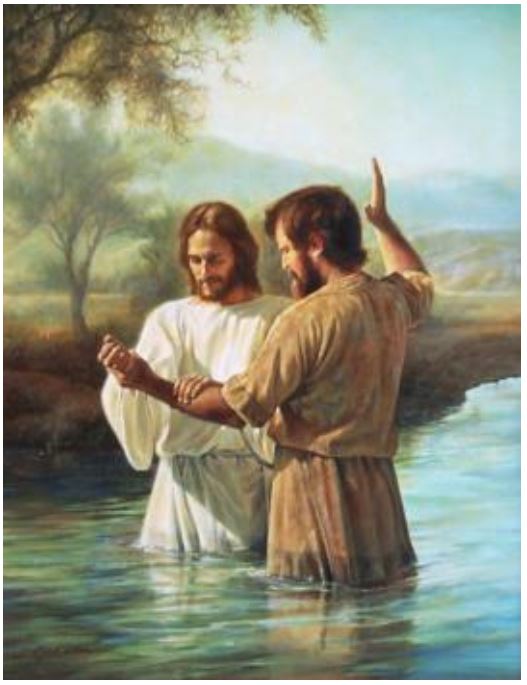
Did the two minds communicate and confer about things? Yes they did.
“These forty days were the occasion of the final conference between the human and the divine minds, or rather the first real functioning of these two minds as now made one. The results of this momentous season of meditation demonstrated conclusively that the divine mind has triumphantly and spiritually dominated the human intellect. The mind of man has become the mind of God from this time on, and though the selfhood of the mind of man is ever present, always does this spiritualized human mind say, ‘Not my will but yours be done.’” [UB 136:4.4]
“After more than five weeks of unbroken communion with his Paradise Father, Jesus became absolutely assured of his nature and of the certainty of his triumph over the material levels of time- space personality manifestation. He fully believed in, and did not hesitate to assert, the ascendancy of his divine nature over his human nature.” [UB 134:8.5]
So, does the human Jesus become only a passive observer after his divine self becomes dominant? It doesn’t seem that way.
¶ The Wedding at Cana
It appears that it was the human Jesus who reacted to events at the wedding at Cana. First, the human Jesus was irritated with Mary and James and rebuked them. Notice the terms, “characteristic indignation.” This was a characteristic the human Jesus had inherited from his mother.
“Jesus derived much of his unusual gentleness and marvelous sympathetic understanding of human nature from his father; he inherited his gift as a great teacher and his tremendous capacity for righteous indignation from his mother.” [UB 122:5.3]
“Early in the afternoon Mary summoned James, and together they made bold to approach Jesus to inquire if he would admit them to his confidence to the extent of informing them at what hour and at what point in connection with the wedding ceremonies he had planned to manifest himself as the “supernatural one.” No sooner had they spoken of these matters to Jesus than they saw they had aroused his characteristic indignation. He said only: ‘If you love me, then be willing to tarry with me while I wait upon the will of my Father who is in heaven.’ But the eloquence of his rebuke lay in the expression of his face.” [UB 137:4.4]
He was irritated a second time, this time with just his mother.
“As Jesus was standing alone in a corner of the garden, his mother approached him, saying, ‘My son, they have no wine.’ And Jesus answered, ‘My good woman, what have I to do with that?’ Said Mary, ‘But I believe your hour has come; cannot you help us?’ Jesus replied: ‘Again I declare that I have not come to do things in this wise. Why do you trouble me again with these matters?’ And then, breaking down in tears, Mary entreated him, ‘But, my son, I promised them that you would help us; won’t you please do something for me?’ And then spoke Jesus: ‘Woman, what have you to do with making such promises? See that you do it not again. We must in all things wait upon the will of the Father in heaven.’” [UB 137:4.8]
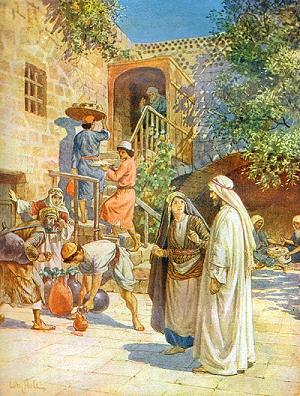
But as Mary broke down in tears, the human Jesus and possibly the Christ Michael consciousness were compassionate and unconsciously did what they had intended not to do.
“Mary the mother of Jesus was crushed; she was stunned! As she stood there before him motionless, with the tears streaming down her face, the human heart of Jesus was overcome with compassion for the woman who had borne him in the flesh; and bending forward, he laid his hand tenderly upon her head, saying: ‘Now, now, Mother Mary, grieve not over my apparently hard sayings, for have I not many times told you that I have come only to do the will of my heavenly Father? Most gladly would I do what you ask of me if it were a part of the Father’s will—’ and Jesus stopped short, he hesitated. Mary seemed to sense that something was happening. Leaping up, she threw her arms around Jesus’ neck, kissed him, and rushed off to the servants’ quarters, saying, ‘Whatever my son says, that do.’ But Jesus said nothing. He now realized that he had already said—or rather desirefully thought—too much.” [UB 137:4.9]
¶ Jesus by the Sea
Andrew sees Jesus weeping by the sea; this seems a reaction of the human Jesus rather than Christ Michael.
“Just before leaving, the apostles missed the Master, and Andrew went out to find him. After a brief search he found Jesus sitting in a boat down the beach, and he was weeping. … [and Jesus said] ‘No one of you has grieved me. I am saddened only because none of my father Joseph’s family have remembered to come over to bid us Godspeed.’ At this time Ruth was on a visit to her brother Joseph at Nazareth. Other members of his family were kept away by pride, disappointment, misunderstanding, and petty resentment indulged as a result of hurt feelings.” [UB 141:0.2]
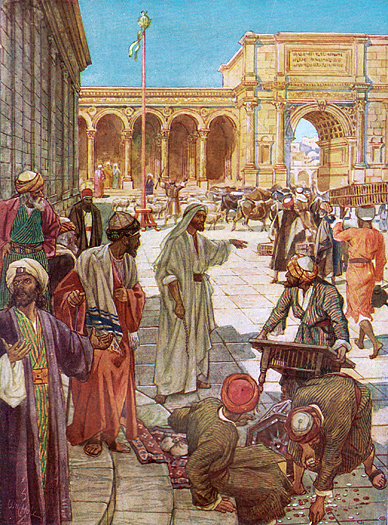
¶ Cleansing the Temple
Again, that “characteristic indignation” is aroused in the human Jesus.
“As Jesus was about to begin his address, two things happened to arrest his attention. At the money table of a near-by exchanger a violent and heated argument had arisen over the alleged overcharging of a Jew from Alexandria, while at the same moment the air was rent by the bellowing of a drove of some one hundred bullocks which was being driven from one section of the animal pens to another. As Jesus paused, silently but thoughtfully contemplating this scene of commerce and confusion, close by he beheld a simple-minded Galilean, a man he had once talked with in Iron, being ridiculed and jostled about by supercilious and would-be superior Judeans; and all of this combined to produce one of those strange and periodic uprisings of indignant emotion in the soul of Jesus.” [UB 173:1.6]
To the amazement of his apostles, standing near at hand, who refrained from participation in what so soon followed, Jesus stepped down from the teaching platform and, going over to the lad who was driving the cattle through the court, took from him his whip of cords and swiftly drove the animals from the temple. But that was not all; he strode majestically before the wondering gaze of the thousands assembled in the temple court to the farthest cattle pen and proceeded to open the gates of every stall and to drive out the imprisoned animals. By this time the assembled pilgrims were electrified, and with uproarious shouting they moved toward the bazaars and began to overturn the tables of the money-changers. In less than five minutes all commerce had been swept from the temple. By the time the near-by Roman guards had appeared on the scene, all was quiet, and the crowds had become orderly; Jesus, returning to the speaker’s stand, spoke to the multitude: ‘You have this day witnessed that which is written in the Scriptures: “My house shall be called a house of prayer for all nations, but you have made it a den of robbers.” [UB 173:1.7]
But of course, there are many times when it’s Christ Michael speaking, not the human Jesus. Such times as when Jesus said, “Who has seen me has seen the Father,” or, “The Father and I are one.” At other times, it may be the unified voice of Christ Michael and the human Jesus speaking.
¶ Going to Jerusalem
I have recently pondered on this: Why did Jesus go to Jerusalem during Passover, thus placing himself in harm’s way? It was because Christ Michael knew what would happen, so the human Jesus knew as well. Was it God’s will for Jesus to be arrested and crucified? If so, then apparently the human Jesus didn’t know this or needed confirmation, so he prayed to God to ask if it was God’s will that he be crucified. Is it possible that Christ Michael decided to end his human experience in this way? Why would he do that? Consider the alternatives: Jesus could have died of old age, then be resurrected, or he could have just vanished like Melchizedek then reappear after a few days as a morontia being. But would these alternatives satisfy the Father’s will? The authors answer these questions.
“The Father in heaven desired the bestowal Son to finish his earth career naturally, just as all mortals must finish up their lives on earth and in the flesh. Ordinary men and women cannot expect to have their last hours on earth and the supervening episode of death made easy by a special dispensation. Accordingly, Jesus elected to lay down his life in the flesh in the manner which was in keeping with the outworking of natural events, and he steadfastly refused to extricate himself from the cruel clutches of a wicked conspiracy of inhuman events which swept on with horrible certainty toward his unbelievable humiliation and ignominious death. And every bit of all this astounding manifestation of hatred and this unprecedented demonstration of cruelty was the work of evil men and wicked mortals. God in heaven did not will it, neither did the archenemies of Jesus dictate it, though they did much to insure that unthinking and evil mortals would thus reject the bestowal Son. Even the father of sin turned his face away from the excruciating horror of the scene of the crucifixion.” [UB 183:1.2]
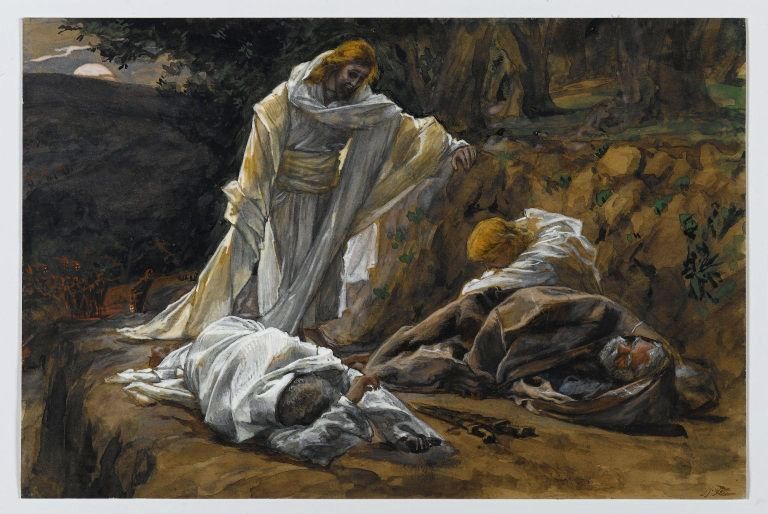
¶ In the Garden of Gethsemane
The human Jesus asked if this cup could be lifted from him. The answer was apparently no. Jesus asked a total of three times if he must drink the cup. This was the second time:
“The Master remained in a prayerful attitude for a few moments, and then, going over to the three apostles, he found them sound asleep, for their eyes were heavy and they could not remain awake. As Jesus awoke them, he said: ‘What! can you not watch with me even for one hour? Cannot you see that my soul is exceedingly sorrowful, even to death, and that I crave your companionship?’ After the three had aroused from their slumber, the Master again went apart by himself and, falling down on the ground, again prayed: ‘Father, I know it is possible to avoid this cup—all things are possible with you— but I have come to do your will, and while this is a bitter cup, I would drink it if it is your will.’ And when he had thus prayed, a mighty angel came down by his side and, speaking to him, touched him and strengthened him.” [UB 182:3.2]
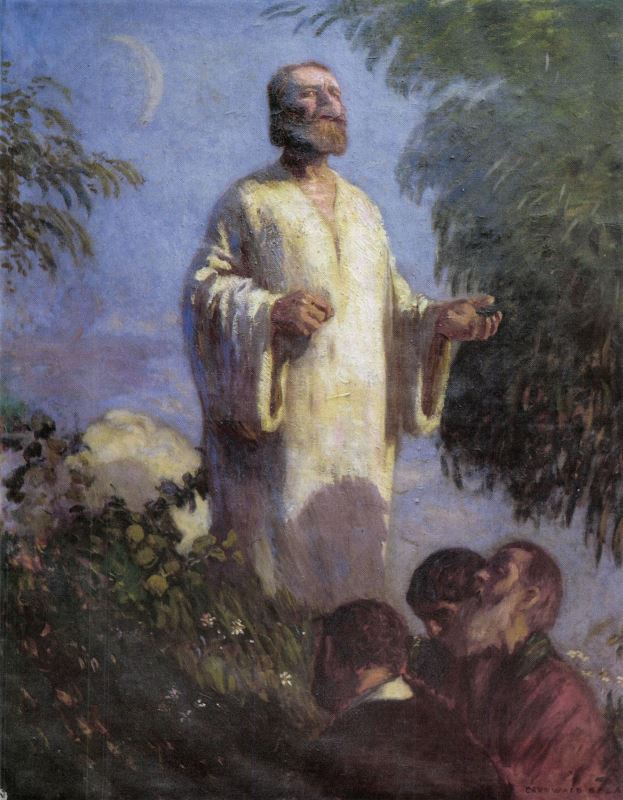
By the third time Jesus prayed, he had fully accepted the Father’s will that he should go through with the ordeal of the crucifixion.
“And then, for a third time, the Master withdrew and prayed: ‘Father, you see my sleeping apostles; have mercy upon them. The spirit is indeed willing, but the flesh is weak. And now, O Father, if this cup may not pass, then would I drink it. Not my will, but yours, be done.’ And when he had finished praying, he lay for a moment prostrate on the ground. When he arose and went back to his apostles, once more he found them asleep. He surveyed them and, with a pitying gesture, tenderly said: ‘Sleep on now and take your rest; the time of decision is past. The hour is now upon us wherein the Son of Man will be betrayed into the hands of his enemies.’ As he reached down to shake them that he might awaken them, he said: ‘Arise, let us be going back to the camp, for, behold, he who betrays me is at hand, and the hour has come when my flock shall be scattered. But I have already told you about these things.’” [UB 182:3.4].
It is certainly understandable that the human Jesus would be so distraught because Christ Michael could discern the future and so Jesus apparently knew in detail the ordeal he was to pass through. And Christ Michael would also feel the pain and humiliation of the crucifixion, but was he in the same amount of distress as the human Jesus? We don’t know. Is it possible Christ Michael foresaw that he would be remembered as a sacrifice to an offended God and was unhappy with that? But he also foresaw that his actual teachings would eventually become the word of truth to all humankind.
¶ Jesus On the Cross
Christ Michael undoubtedly experienced all the pain and humiliation that the human Jesus did as part of his human experience, but only the human Jesus died on the cross. The authors indicate that Christ Michael was present in some form in some administrative proceedings in the local universe of Nebadon during the three days that Jesus’ body was in the tomb.
“The Creator consciousness of Michael must have been at large and wholly free from its associated mortal mind of the physical incarnation.” [UB 188:3.6]
”There are records extant which show that during this period the supreme council of Salvington, numbering one hundred, held an executive meeting on Urantia under the presidency of Gabriel. There are also records showing that the Ancients of Days of Uversa communicated with Michael regarding the status of the universe of Nebadon during this time.” [UB 188:3.12]
“We know that at least one message passed between Michael and Immanuel on Salvington while the Master’s body lay in the tomb.” [UB 188:3.13]
“There is good reason for believing that some personality sat in the seat of Caligastia in the system council of the Planetary Princes on Jerusem which convened while the body of Jesus rested in the tomb.” [UB 188:3.14]
“The records of Edentia indicate that the Constellation Father of Norlatiadek was on Urantia, and that he received instructions from Michael during this time of the tomb.” [UB 188:3.15]
“And there is much other evidence which suggests that not all of the personality of Jesus was asleep and unconscious during this time of apparent physical death.” [UB 188:3.16]
So Christ Michael was active during the three days Jesus was in the tomb and unaware of anything. Then came the resurrection when Jesus appeared in morontia form, but was the mortal Jesus a part of the resurrected person? Our unseen friends are apparently divided on this issue. Some think the mortal Jesus was still with Christ Michael in morontia form, but others disagree.
“We are not able fully to explain just what happened to Jesus of Nazareth during this period of a day and a half when he was supposed to be resting in Joseph’s new tomb. Apparently he died the same natural death on the cross as would any other mortal in the same circumstances. We heard him say, ‘Father, into your hands I commend my spirit.’ We do not fully understand the meaning of such a statement inasmuch as his Thought Adjuster had long since been personalized and so maintained an existence apart from Jesus’ mortal being. The Master’s Personalized Adjuster could in no sense be affected by his physical death on the cross. That which Jesus put in the Father’s hands for the time being must have been the spirit counterpart of the Adjuster’s early work in spiritizing the mortal mind so as to provide for the transfer of the transcript of the human experience to the mansion worlds. There must have been some spiritual reality in the experience of Jesus which was analogous to the spirit nature, or soul, of the faith-growing mortals of the spheres. But this is merely our opinion—we do not really know what Jesus commended to his Father.” [UB 188:3.4]
“The acquired spirit identity of the man of Nazareth which was built up during his lifetime in the flesh, first, by the direct efforts of his Thought Adjuster, and later, by his own perfect adjustment between the physical necessities and the spiritual requirements of the ideal mortal existence, as it was affected by his never- ceasing choice of the Father’s will, must have been consigned to the custody of the Paradise Father. Whether or not this spirit reality returned to become a part of the resurrected personality, we do not know, but we believe it did. But there are those in the universe who hold that this soul-identity of Jesus now reposes in the ‘bosom of the Father,’ to be subsequently released for leadership of the Nebadon Corps of the Finality in their undisclosed destiny in connection with the uncreated universes of the unorganized realms of outer space.” [UB 188:3.8]
The two preceding quotes inform us of an important point; Jesus was indwelt by two spiritual beings, Christ Michael and a thought adjuster. It seems that the human Jesus’ interaction with his thought adjuster was just the same as our interaction is with ours. Jesus moved up through the psychic circles by following adjuster guidance just as we do. Only the end result was different; Jesus did not fuse with his adjuster; his adjuster was personalized. Christ Michael would experience just what Jesus was experiencing, but would he be involved in any way? Perhaps Christ Michael conferred with Jesus’ adjuster, but in order to experience the purely human nature of the interaction, it seems to me Michael wouldn’t have intervened in the human-adjuster interaction. If this is true, then Jesus’ work with his adjuster was a purely human experience.
So when we finally meet Christ Michael in person, will he seem like the human Jesus as well as a Creator Son? It seems to me that even if the resurrected soul of the human Jesus isn’t a part of Christ Michael, some aspect of Michael’s personality will seem familiar to us due to his experiencing the mortal life of Jesus. Of course, he will also manifest the awesome presence of a Creator Son. It will be among the most memorable experiences of our ascension career!
¶ References
- Article obtained from The Fellowship site
| Song for Papa’s Family | Volume 21, Number 1, 2021 (Summer) — Index | Thinking of my Divine Mother, aka the Holy Spirit |